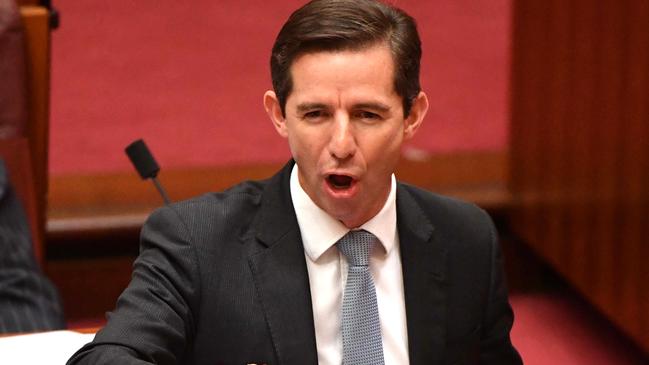Simon Birmingham gives way on top-ups for student loans
Education Minister Simon Birmingham has eased the impact of the government’s planned cap on student loans.

Federal Education Minister Simon Birmingham has eased the impact of the government’s planned cap on student loans, giving in to a push from Liberal senators to be more generous to students.
An amended bill, with the softer conditions, passed the House of Representatives yesterday with support from Nick Xenophon Team MP Rebekha Sharkie. It bolsters government hopes that it will pass the Senate this week with the support of the crossbench against Labor and Greens opposition.
Senator Birmingham has accepted a call from three Liberal senators on the committee that examined the bill — Lucy Gichuhi, Jim Molan and James Paterson — to allow the student loan cap to be replenishable.
Instead of the hard lifetime limit of $104,440 that can be borrowed through the Higher Education Loan Program, students who hit the cap will be able to borrow again provided they have repaid some of their loan. They will be entitled to borrow up to the level of the cap. The cap for medical and veterinary science students is set higher at $150,000, but the replenishing principle still applies.
Some universities also have pushed for the cap to be replenishable, saying that if workers are to re-skill to deal with rapid technological and economic change, a replenishable loan cap is needed.
The bill also introduces a lower repayment threshold for all HELP loans, meaning borrowers will begin repaying (at a rate of 1 per cent of income) once their annual income reaches $45,000, instead of the present $55,874.
It also reduces the probable future increases in the income threshold by indexing it to the generally lower consumer price index instead of average weekly earnings.
Both measures will help rein in the rising cost to the government of HELP loans but will make students repay loans earlier.
Innovative Research Universities executive director Conor King said the renewable cap helped deal with the problem of the “renewing of skills in mid and later life”, and the lower loan repayment threshold was preferable to other higher education cuts.
Student groups oppose the bill.
“If this comes into effect, graduates and students will be paying back their student loans when they are earning not much more than minimum wage,” said Natasha Abrahams, president of the Council of Australian Postgraduate Associations.



